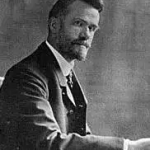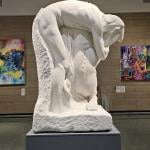An Example of Unwarranted Theological Speculation: Divine Timelessness
In my immediately preceding post I argued that far too much Christian theology includes unwarranted speculation—especially about God. Under pressure from Greek ontology traditional, “classical theism” has generally agreed that the God of Abraham, Isaac and Jacob (the Yahweh of the Bible) is somehow (i.e., differently expressed) “outside of time” such that temporal sequence, the passage of past into present into future (or future into present into past) is known to God but not experienced by God. Put in other words, for this classical theistic view, God’s eternity means (in relation to time) “simultaneity with all times.” In other words, in this view, explained best (most scholars agree) by Boethius, God exists in an “eternal now.” For him, our future has already happened. In other words, this is not just a claim about God’s foreknowledge; it is a claim about God’s being. It is not merely epistemological; it is ontological.
I have taught Christian theology on both the undergraduate and graduate levels for thirty-four years. I can say without hesitation that the vast majority of my students think this is biblical theology and orthodoxy. They think this view of God’s eternity, timelessness, being “outside of time,” is part and parcel of Christianity, the Christian faith, even the gospel itself. Try questioning it and you will (I have) experience(d) strenuous push back. I suspect many people think two things about this traditional view of God’s eternity and time. First, it is necessary for God’s transcendence; if God is somehow “within time” or if time is “real for God,” then (God forbid!) God must be limited. Second, it undermines God’s power and sovereignty and makes God unreliable. The future, scary to us, becomes scary to God, too. As one theologian expressed it, denial of the classical view makes God a “pathetic, hand wringing God who has to wait fearfully to see what will happen.”
And yet…
Nowhere does the biblical story of God, the biblical narrative that identifies God for us, and upon which classical Christian theology claims to be based, say or even hint that God is “outside of time” or “timeless” or that all times are “simultaneously before the eyes of God.” This view of God’s eternity entered into Christian theology from Greek philosophy which regarded time as imperfection. Greek philosophy was notoriously negative with regard to time. Hebrew thought was not; it regarded time and history as the framework for God’s action. Many Christian theologians, not all liberal, began to see this especially in the nineteenth century and began to deconstruct the Greek influences in Christian theology insofar as they were extra-biblical and tended to de-personalize God. Among the earliest to begin this deconstruction project were Richard Watson (Methodist), I. A. Dorner (Lutheran-Reformed), and even Karl Barth (Reformed). (Barth’s belief about God’s relation to time was complex and ultimately ambiguous, but there can be no denying that he incorporated time into God even if he called God’s time “divine temporality.”) (Many conservative theologians “blame” liberal Adolph Harnack for this de-Hellenizing project, but he was not alone.)
And yet…
As Christian philosophers Nicholas Wolterstorff and Keith Ward (among others) have strenuously pointed out, a “timeless being” cannot interact with temporal beings. In fact, such a being, free entirely of the flow of time, cannot “act” in time at all. In fact, he cannot even know that “today is February 18, 2015.” But most importantly, as Christian philosopher Dallas Willard pointed out most emphatically in The Divine Conspiracy, such a God cannot be affected by our prayers.
So how to preserve God’s transcendence together with denial of God’s timeless eternity? This has been answered many times by many philosophers and theologians. The answer is “creation as kenosis.” This is explained in many books but especially clearly in The Work of Love: Creation as Kenosis edited by theologian-scientist John Polkinghorne (Eerdmans, 2001). Polkinghorne’s own contribution to the book is best: “Kenotic Creation and Divine Action.” The point is that God’s entry into time with us (T. F. Torrance in Space, Time, and Incarnation) is voluntary. Why would God do this? Out of love for the sake of having real relationships with temporal creatures made in his own image and likeness. A “timeless” God who is not temporal cannot be affected by anything temporal beings do. The great medieval scholastic theologians knew this and described all God’s relations with temporal creatures as external, not internal. In other words, God remains unchanged, unaltered in every way. They drew the natural, reasonable conclusion that an eternal God, one for whom our past, present and future are all “now,” must be immutable and even impassible in the strongest senses possible. He can act but not react. (Whether he can even act within time is strongly questioned by Wolterstorff and Ward and other Christian philosophers.)
God’s transcendence lies in the fact that he remains self-sufficient in his eternal nature and character; time does not erode or add to God’s being. And the voluntarily temporal God remains omnipotent and everlasting. Time does not limit or threaten his being or power.
The conclusion of many modern Christian thinkers (and here I am excluding process theologians such as Nelson Pike whose 1970 book God and Timelessness is a devastating logical critique of the traditional view) is that the classical view of God’s eternity (“outside of time,” “eternal now-ness”) is pure philosophical-theological speculation unrelated to the God of the Bible and alien to any religion that values an interactive God. It tends to make God remote, uninvolved, inaccessible and non-relational (except within himself).
I often wonder about the possible connection between this classical view of God’s eternity (viz., “outside of time”) and many Christians’ view of prayer. When I ask my students if they have heard the saying that “Prayer doesn’t change things; it changes me” almost all confess that they heard it in church or home or somewhere among Christians. That prayer changes me is not contested; that prayer can change the mind of God is clearly biblical. To say otherwise is to reduce numerous passages of Scripture to mere imagery, “anthropomorphism,” and to gut petitionary prayer. I suspect that the idea of God as “outside of time,” “eternal now,” “non-temporal,” contributes to and supports that false idea of prayer.
So why did this traditional view of God’s eternity (“timelessness”) invade Christian theology which claims to be based on the Bible or at least governed by the Bible? I suspect the Greek “logic of perfection” contributed to it—the idea that God is perfect, time is imperfect, therefore God must be timeless. A more biblical way of looking at the subject would be that God is perfect, love is perfect, love between God and created beings requires freedom-in-and-for relationship, freedom-in-and-for relationship (between God and created beings) requires time, it is more perfect for God to enter into time than to remain outside time.
At this point in a conversation about this subject many Christians will ask “Why can’t God enter into time and be outside of time also?” But think about that language. How can a non-temporal being “enter into time” while also remaining outside of time? If what has been said is true, then only “part of God” would be in real relationship with free creatures. There would still be “part of God” for whom the future has already happened. If the future has already happened at all, for anyone, even for a “part of God,” then history’s unfolding including our ability to affect God (e.g., with prayer) is a charade. The idea that this problem can be solved by positing that God both enters into time and remains outside of time is simply another way of saying God is timeless. It doesn’t solve anything.
But more importantly, the logic of the Bible, the flow of the biblical narrative, God’s story with us, never says or even hints that God is “outside of time.” It only says that God is everlasting and hints (very strongly) that God is lord of time. All that the biblical narrative requires is that God be omnipotent within time and able to guarantee his victory over whatever forces oppose him.
If there is some aspect of God that remains above or outside of time, I do not know how to speak of that, how even to imagine that, how to make that consistent with God within time (and God in real relation with creatures in time). Therefore, I leave that aside, simply lay it down, and ignore it. It doesn’t function in truly biblical theology except as a metaphysical compliment some people feel compelled to pay to God. I don’t feel so compelled by the Bible or reason. I realize that the temporal view of God goes against the bulk of Christian tradition, but the traditional, classical view is derived from alien sources. It is a foreign body within biblical theology. “The God of the philosophers is not the God of Abraham, Isaac and Jacob.” And it can have negative consequences for Christian practices such as prayer.
Theologian Robert Jenson is widely considered one of the most astute contemporary Christian theologians. Many of his books (such as God after God: The God of the Past and the Future as Seen in the Work of Karl Barth [1969] and The Triune Identity: God According to the Gospel [1982]) strongly point toward a temporal view of God. Page 4 of The Triune Identity powerfully expresses what I (and other non-process theologians who embrace a temporal view of God) believe. “God may be God because in him all that will be is already realized, so that the novelties of the future are only apparent and its threats therefore not overwhelming. Or God may be God because in him all that has been is opened to transformation, so that the guilts of the past and immobilities of the present are rightly to be interpreted as opportunities of creation.”











